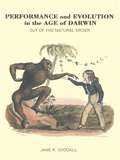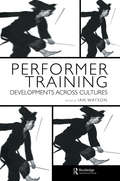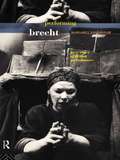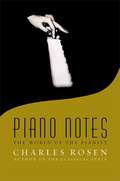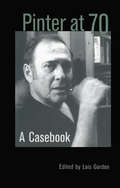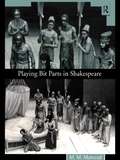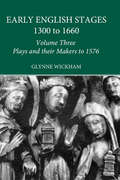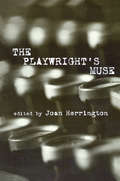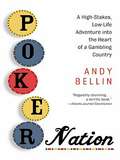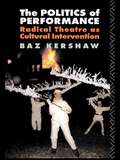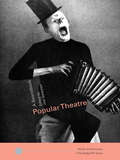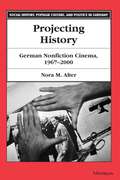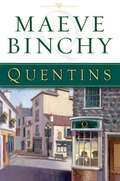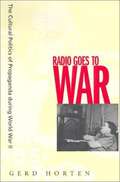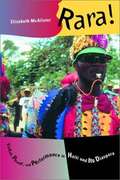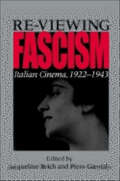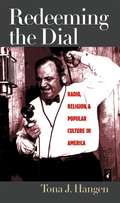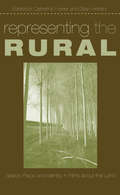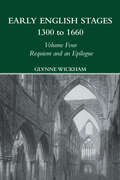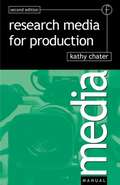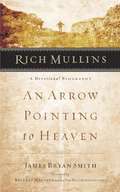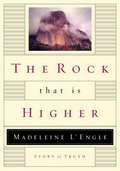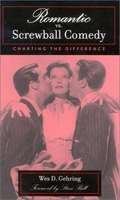- Table View
- List View
Performance and Evolution in the Age of Darwin: Out of the Natural Order
by Jane GoodallPerformance and Evolution in the Age of Darwin reveals the ways in which the major themes of evolution were taken up in the performing arts during Darwin's adult lifetime and in the generation after his death. The period 1830-1900 was the formative period for evolutionary ideas. While scientists and theorists investigated the law and order of nature, show business was more concerned with what was out of the natural order. Missing links and throwbacks, freak taxonomies and exotic races were favourite subject matter for the burgeoning variety theatre movement. Focusing on popular theatre forms in London, New York and Paris, Jane Goodall shows how they were interwoven with the developing debate about human evolution. With this book, Goodall contributes an important new angle to the debates surrounding the history of evolution. She reveals that, far from creating widespread culture shock, Darwinian theory tapped into some of the long-standing themes of popular performance and was a source for diverse and sometimes hilarious explorations.
Performer Training: Developments Across Cultures (Contemporary Theatre Studies #Vol. 38)
by Ian WatsonPerformer Training is an examination of how actors are trained in different cultures. Beginning with studies of mainstream training in countries such as Poland, Australia, Germany, and the United States, subsequent studies survey: · Some of Asia's traditional training methods and recent experiments in performer training · Eugenio Barba's training methods · Jerzy Grotowski's most recent investigations · The Japanese American NOHO companies attempts at integrating Kyogen into the works of Samuel Beckett · Descriptions of the training methods developed by Tadashi Suzuki and Anne Bogart at their Saratoga International Theatre Institute · Recent efforts to re-examine the role and scope of training, like Britain's International Workshop Festival and the European League of Institutes of Arts masterclasses · The reformulation of the use of emotions in performer training known as Alba Emoting.
Performing Brecht
by Margaret EddershawPerforming Brecht is an unprecedented history of the productions of Brecht's plays in Britain over forty years. Margaret Eddershaw surveys all aspects of Brecht in performance, from his methodologies to his place in postmodernist theatre and beyond.She focuses on key productions by directors including George Devine, Sam Wanamaker, William Gaskill, Howard Davies, John Dexter and Richard Eyre. Eddershaw also provides three in-depth case studies of productions in the 1990s, incorporating her own exclusive access to the rehearsals and in-depth interviews with directors and performers. The case studies are: * The Good Person of Sechuan, directed by Deborah Warner and starring Fiona Shaw; * Mother Courage, directed by Philip Prowse and starring Glenda Jackson; * The Resistable Rise of Arturo Ui, directed by Di Trevis and starring Antony Sher
Piano Notes: The World of the Pianist
by Charles RosenCharles Rosen is one of the world's most talented pianists -- and one of music's most astute commentators. Known as a performer of Bach, Beethoven, Stravinsky, and Elliott Carter, he has also written highly acclaimed criticism for sophisticated students and professionals. In Piano Notes, he writes for a broader audience about an old friend -- the piano itself. Drawing upon a lifetime of wisdom and the accumulated lore of many great performers of the past, Rosen shows why the instrument demands such a stark combination of mental and physical prowess. Readers will gather many little-known insights -- from how pianists vary their posture, to how splicings and microphone placements can ruin recordings, to how the history of composition was dominated by the piano for two centuries. Stories of many great musicians abound. Rosen reveals Nadia Boulanger's favorite way to avoid commenting on the performances of her friends ("You know what I think," spoken with utmost earnestness), why Glenn Gould's recordings suffer from "double-strike" touches, and how even Vladimir Horowitz became enamored of splicing multiple performances into a single recording. Rosen's explanation of the piano's physical pleasures, demands, and discontents will delight and instruct anyone who has ever sat at a keyboard, as well as everyone who loves to listen to the instrument. In the end, he strikes a contemplative note. Western music was built around the piano from the classical era until recently, and for a good part of that time the instrument was an essential acquisition for every middle-class household. Music making was part of the fabric of social life. Yet those days have ended. Fewer people learn the instrument today. The rise of recorded music has homogenized performance styles and greatly reduced the frequency of public concerts. Music will undoubtedly survive, but will the supremely physical experience of playing the piano ever be the same?
Pinter at 70: A Casebook (Casebooks on Modern Dramatists #Vol. 30)
by Lois GordonThis comprehensive and authoritative casebook includes cornerstone essays on Pinter's creative process, his politics, film adaptations, and acting career. It also includes a collection of photos found nowhere else that document Pinter's "golden time"--his early acting days in Ireland--, a substantial introduction, a chronology, and bibliography.
Playing Bit Parts in Shakespeare
by Professor M Mahood M.M. MahoodPlaying Bit Parts in Shakespeare is a unique survey of the small supporting roles - such as foils, feeds, attendants and messengers - that feature in Shakespeare's plays. Exploring such issues as how bit players should conduct themselves within a scene, and how blank verse or prose may be spoken to bring out the complexities of character-definition, Playing Bit Parts in Shakespeare brings a wealth of insights to the dynamic of scenic construction in Shakespeare's dramaturgy. M.M. Mahood explores the different functions of minimal characters, from clearing the stage to epitomizing the overall effect of the comedy or tragedy, and looks at how they can extend the audience's knowledge of the social world of the play. She goes on to describe the entire corpus of minimal roles in a selection of six plays: * Richard III * The Tempest * King Lear * Antony & Cleopatra * Measure for Measure * Julius Caesar This new edition comes enhanced with a new Appendix, 'Who Says What', especially designed to aid directors in making decisions about the speaking parts of the minimal characters. It also comes complete with an index of characters (including line references) as well as a detailed general index. An invaluable aid for directors and actors in the rehearsal room, this perceptive and informative volume is equally of interest to students studying and writing about Shakespeare's plays.
Plays and their Makers up to 1576
by Glynne WickhamThis volume forms part of the 5 volume set Early English Stages 1300-1660. This set examines the history of the development of dramatic spectacle and stage convention in England from the beginning of the fourteenth century to 1660.
The Playwright's Muse (Studies in Modern Drama #Vol. 13)
by Joan HerringtonFirst Published in 2002. Routledge is an imprint of Taylor & Francis, an informa company.
Poker Nation: A High-Stakes, Low-Life Adventure into the Heart of a Gambling Country
by Andy BellinA deep dive into the world of poker, Texas no-limit hold 'em style, with philosophical ruminations on the appeal of gambling in American culture. Journalist and semi-pro poker player shares his experiences with the game while providing useful tips. Includes info on Texas Hold'em, roulette, and Black Jack as well as advice on counting cards, reading body language, probability, and more.
The Politics of Performance: Radical Theatre as Cultural Intervention
by Baz KershawThe Politics of Performance^ addresses fundamental questions about the social and political purposes of performance through an investigation into post-war alternative and community theatre. It proposes a theory of performace as ideological transaction, cultural intervention and community action, which is used to illuminate the potential social and political effects of radical performance practice. It raises issues about the nature of alternative theatre as a movement and the aesthetics of its styles of production, especially in relation to progressive counter-cultural formations. It analyses in detail the work of key practitioners in socially engaged theatre during four decades, setting each in the context of social, political and cultural history and focusing particularly on how they used that context to enhance the potential efficacy of their productions. The book is thus a detailed analysis of oppositional theatre as radical cultural practice in its various efforts to subvert the status quo. Its purpose is to raise the profile of these approaches to performance by proposing, and demonstrating how they may have had a significant impact on social and political history.
Popular Theatre: A Sourcebook (Worlds of Performance)
by Joel SchechterBertolt Brecht turned to cabaret; Ariane Mnouchkine went to the circus; Joan Littlewood wanted to open a palace of fun. These were a few of the directors who turned to popular theatre forms in the last century, and this sourcebook accounts for their attraction.Popular theatre forms introduced in this sourcebook include cabaret, circus, puppetry, vaudeville, Indian jatra, political satire, and physical comedy. These entertainments are highly visual, itinerant, and readily understood by audiences. Popular Theatre: A Sourcebook follows them around the world, from the bunraku puppetry of Japan to the masked topeng theatre of Bali to South African political satire, the San Francisco Mime Troupe's comic melodramas, and a 'Fun Palace' proposed for London.The book features essays from the archives of The Drama Review and other research. Contributions by Roland Barthes, Hovey Burgess, Marvin Carlson, John Emigh, Dario Fo, Ron Jenkins, Joan Littlewood, Brooks McNamara, Richard Schechner, and others, offer some of the most important, informative, and lively writing available on popular theatre. Introducing both Western and non-Western popular theatre practices, the sourcebook provides access to theatrical forms which have delighted audiences and attracted stage artists around the world.
Projecting History
by Nora M. AlterThe intersection between social, historical, and political developments in Germany and the emergence of a nonfiction mode of film production
Quentins
by Maeve BinchyIs it possible to tell the story of a generation and a city through the history of a restaurent? A story of the lives of many people who ate at the famous Quentins.
Radio Goes to War: The Cultural Politics of Propaganda During World War II
by Gerd HortenAs a comprehensive and in-depth look at the role of domestic radio in the United States during the Second World War, this study demonstrates how radio broadcasting played a crucial role both in government propaganda and within the context of the broader cultural and political transformations of wartime America and argues that no medium merged entertainment, propaganda, and advertising more effectively than radio.
Rap a Tap Tap, Here's Bojangles--Think of That!
by Leo Dillon Diane DillonThis book for young children tells the story of Bill "Bojangles" Robinson--an African-American tap dancer and one of the most popular entertainers of the 1920's-30s.
Rara! Vodou, Power, and Performance in Haiti and Its Diaspora
by Elizabeth A. McalisterThis book is the first full-length study of the religious music festival known as Rara as it is traditionally practiced in Haiti and Brooklyn. A centuries-old religious tradition with roots in plantation slavery, this community-produced music grows out of Afro-Haitian voodoo and is frequently used to launch political criticism.
Re-viewing Fascism: Italian Cinema, 1922–1943
by Jacqueline Reich and Piero GarofaloWhen Benito Mussolini proclaimed that "Cinema is the strongest weapon," he was telling only half the story. In reality, very few feature films during the Fascist period can be labeled as propaganda. Re-viewing Fascism considers the many films that failed as "weapons" in creating cultural consensus and instead came to reflect the complexities and contradictions of Fascist culture. The volume also examines the connection between cinema of the Fascist period and neorealism—ties that many scholars previously had denied in an attempt to view Fascism as an unfortunate deviation in Italian history. The postwar directors Luchino Visconti, Roberto Rossellini, and Vittorio de Sica all had important roots in the Fascist era, as did the Venice Film Festival. While government censorship loomed over Italian filmmaking, it did not prevent frank depictions of sexuality and representations of men and women that challenged official gender policies. Re-viewing Fascism brings together scholars from different cultural and disciplinary backgrounds as it offers an engaging and innovative look into Italian cinema, Fascist culture, and society.
Redeeming the Dial
by Tona J. HangenBlending cultural, religious, and media history, Tona Hangen offers a richly detailed look into the world of religious radio. She uses recordings, sermons, fan mail, and other sources to tell the stories of the determined broadcasters and devoted listeners who, together, transformed American radio evangelism from an on-air novelty in the 1920s into a profitable and wide-reaching industry by the 1950s.Hangen traces the careers of three of the most successful Protestant radio evangelists--Paul Rader, Aimee Semple McPherson, and Charles Fuller--and examines the strategies they used to bring their messages to listeners across the nation. Initially shut out of network radio and free airtime, both of which were available only to mainstream Protestant and Catholic groups, evangelical broadcasters gained access to the airwaves with paid-time programming. By the mid-twentieth century millions of Americans regularly tuned in to evangelical programming, making it one of the medium's most distinctive and durable genres. The voluntary contributions of these listeners in turn helped bankroll religious radio's remarkable growth. Revealing the entwined development of evangelical religion and modern mass media, Hangen demonstrates that the history of one is incomplete without the history of the other; both are essential to understanding American culture in the twentieth century.
Representing the Rural: Space, Place, and Identity in Films about the Land
by Gillian Helfield Catherine FowlerA comprehensive and in-depth examination of the role of rural space in the cinema, contributing needed analysis to existing work on space, place, and identity in film.
Requiem and an Epilogue
by Glynne WickhamFirst published in 2002.This volume forms part of the 5 volume set Early English Stages 1300-1660. This set examines the history of the development of dramatic spectacle and stage convention in England from the beginning of the fourteenth century to 1660.
Research for Media Production (Media Manuals Ser.)
by Kathy ChaterOutlines the main skills, techniques and practices for the job of the researcher. An easy to follow guide to production research, it will help the new researcher to understand the possibilities to be considered when undertaking research and the kind of questions that need to be asked at each stage of the production process. Every project, whether it's a programme for television or radio or an article for publication is different and there is no one, correct answer to each situation. Based on the author's wealth of experience as a researcher on many and varied kinds of broadcast and non-broadcast programmes, this quick reference will guide the reader through the problems they are likely to encounter and help to resolve them. It also includes many tips to help the reader gain a better understanding of the real world of production.Research for Media Production is a rework and expanded edition of Production Research also written by Kathy Chater.
Rich Mullins: An Arrow Pointing to Heaven
by James Bryan SmithDuring his life, Rich Mullins challenged the sensibilities of what it means to follow Jesus in today's world, and now in his death, he challenges all to build upon his legacy of joy, compassion, brokenness, unblinking honesty, and wonder of an Awesome God.
The Rock That Is Higher: Story As Truth
by Madeleine L'Engle"We are all strangers in a strange land, longing for home, but not quite knowing what or where home is. We glimpse it sometimes in our dreams, or as we turn a corner, and suddenly there is a strange, sweet familiarity that vanishes almost as soon as it comes Madeleine L Engle, from "The Rock That Is Higher Story captures our hearts and feeds our imaginations. It reminds us who we are and where we came from. Story gives meaning and direction to our lives as we learn to see it as an affirmation of God s love and truth an acknowledgment of our longing for a rock in the midst of life s wilderness. Drawing upon her own experiences, well-known tales in literature, and selected narratives from Scripture, Madeleine L Engle gently leads the way into the glorious world of story in "The Rock That Is Higher. " Here she acknowledges universal human longings and considers how literature, Scripture, personal stories, and life experiences all point us toward our true home. "
Romantic vs. Screwball Comedy: Charting the Difference
by Wes D. JehringThis examination of film comedies distinguishes the elements which separate the screwball comedy from the romantic comedy. A great resource for film scholars, movie fans, and writers.
